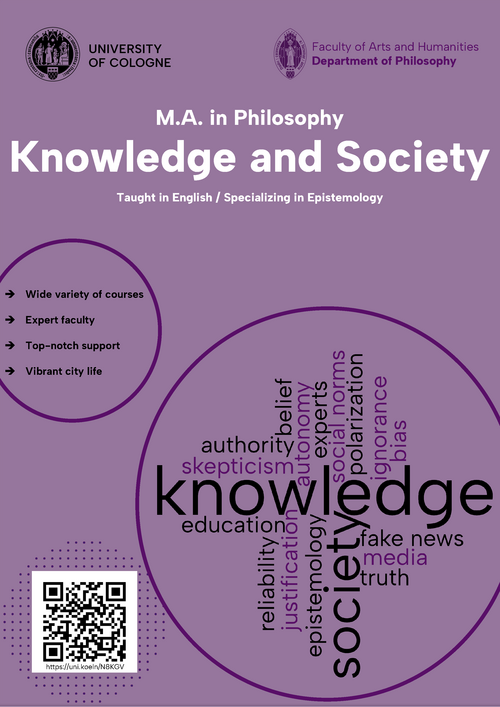Knowledge and Society, Master of Arts
Important general information
This is a consecutive Master's degree programme. This means that in order to be able to enrol for the programme, one must have achieved at least 40 ECTS in philosophy in previous studies.
Course description
The Master programme Knowledge and Society focuses on philosophical issues concerning the social, political, and technological context of knowledge acquisition and transmission. It combines rigorous academic training in analytic philosophy (epistemology) and experience with important areas in which the philosophy of knowledge intersects with other topics of societal concern, including (but not limited to) testimony, disagreement, implicit biases, resistance to evidence, science communication, trust, epistemic authority, feminist epistemology, epistemic injustice, epistemic bubbles and echo chambers, relativism, fake news, group knowledge and ignorance, propaganda and polarisation. It enables the next generation of humanities graduates to develop and transmit knowledge of key epistemological themes as they take up careers in academia, media, education, heritage, government and non-governmental organisations, and the private sector.
The study programme equips students with the skills to identify and individuate epistemological issues as they arise in real-world settings. It focuses on developing the ability to analyse collective knowledge generation processes and acquiring skills to recognize and evaluate the social mechanisms of knowledge transfer. Additionally, the programme teaches the ability to explore the role of knowledge in policy-making and gaining a critical understanding of social threats to knowledge. Students will master various epistemological approaches, tools, and theories for studying social, political, and technological phenomena. This includes acquiring the capability to analyse and discuss Western and non-Western philosophical sources, critically interpret them, and develop skills in studying the history of epistemology and its interdependence with other philosophical fields such as the philosophy of science, metaphysics, and moral philosophy. Furthermore, students learn to appreciate the diversity of perspectives, cultural expressions, social formations, and practices related to epistemology, and understand and critically reflect upon these phenomena using state-of-the-art epistemological tools and methods.
Structure
The Master's programme comprises seven subject modules. Three basic modules concern topics of epistemology. Two specialisation modules deepen these studies. And two advanced modules prepare the students for writing a final thesis based on cutting edge research:
- Basic Modules: In the modules BM1 "Foundations of Epistemology" and BM2 "Applied Epistemology", exemplary systematic topics and issues of theoretical philosophy with a focus on fundamental and applied questions from epistemology are studied in depth in a research-oriented manner. In module BM3 "Traditions in Epistemology", students acquire knowledge of selected epistemological traditions.
- Specialisation Modules: Knowledge and science are deeply connected. The focus area "Knowledge, Science, Society” in the modules SM1 and SM2 explores this connection in systematic terms and in recourse to the societal and historical conditions of knowledge and science.
- Advanced Modules: The advanced modules AM1 and AM2 are designed as research modules. They tie in with the studies of the specialisation areas (SM1 and SM2) and serve the preparation, structuring and intellectual concretisation of one's own research with the aim of writing a final thesis that is situated at the height of current research debates.
Term-Related Overview
| CP Overview | ||||
| Term | Module | C | SSt | CP |
| 1 | Basic Module 1: Foundations of Epistemology | 60 h | 300 h | 12 CP |
| 1 | Basic Module 2: Applied Epistemology | 60 h | 300 h | 12 CP |
| 1/2 | Basic Module 3: Traditions in Epistemology | 60 h | 300 h | 12 CP |
| 1/2 | Specialisation Module 1: Knowledge, Science, and Society I | 90 h | 360 h | 15 CP |
| 2/3 | Specialisation Module 2: Knowledge, Science, and Society II | 90 h | 360 h | 15 CP |
| 3 | Advanced Module 1: In-Depth Research I | 60 h | 300 h | 12 CP |
| 3 | Advanced Module 2: In-Depth Research II | 60 h | 300 h | 12 CP |
| 4 | Master’s Thesis Module | 0 h | 900 h | 30 CP |
Important documents at a glance
More information can be found in the module handbook.
Prerequisites
Those who have obtained a Bachelor's degree or a comparable degree in philosophy can be admitted to the Master's programme in philosophy. After a case-by-case examination, Bachelor's graduates and graduates with a comparable degree in related subjects can also be admitted, provided that at least 40 relevant CPs have been acquired in the preceding study programme or that the corresponding achievements have been reached. The decision on admission is made by the admissions committee. In addition, proof of English language skills at the level B2 of the Common European Framework of Reference for Languages (CEFRL) is required.
